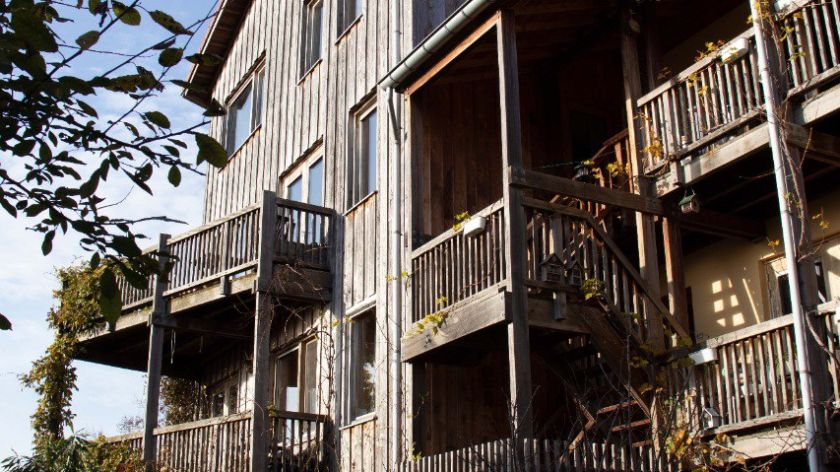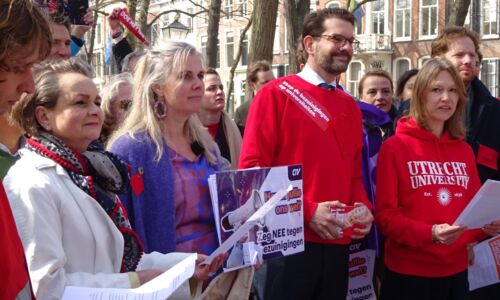Collective living in Nijmegen: ‘This is a way more affordable way of housing’
Built out of straw, clay, loam and wood, collective housing unit Strowijk in Lent is a unique example of collective living. A student and a researcher of Radboud University call the place home. Now, the project has drawn attention from the city council. ‘Strowijk has done much more than just providing housing.’
IEWAN, locally called Strowijk, is one of the largest ecological housing complexes in the Netherlands. And since a few years, it has been the home of Noor van der Vorst, a Human Geography master’s student, and Kiane de Kleijne, a PhD candidate in Environmental Sciences at Radboud University. The housing complex, initiated by the Arnhem-Nijmegen Ecological Living Initiative Group, is built out of straw, clay, loam and wood and has been a one-of-its-kind success for collective living.
‘We share the kitchen, toilets and common spaces in the house’ says Van der Vorst, while explaining what ‘co-living’ entails. And, though the concept of co-living is advantageous for the environment and can help when it comes to saving rent, living at Strowijk also forces its inhabitants to scale down. De Kleijne: ‘But scaling down is no compromise at all.’
Open doors
Sharing spaces and living small also ensures a social and communal atmosphere. ‘It feels comforting to have neighbours who are always reachable’, says Van der Vorst. And a walk into the corridors of the housing complex makes it evident that the doors stay open and the people approachable. ‘The communal atmosphere is an essential part of my life’, says De Kleijne, who has lived at the complex for about four years.
‘The communal atmosphere is an essential part of my life’
However, it is not just the open-door concept of the housing complex which makes it stand out: inter-generational multiplicity shapes the character of IEWAN as well. Van der Vorst has made friends with a neighbour in their fifties with whom she maintains a veggie plot. ‘Something like that would not be possible in a typical student house.’
Upkeep
While living at the complex, residents are obliged to take up a certain task. The technical group does the maintenance and minor repairs, the internal group facilitates conversations among members, the garden group maintains the green spaces, and the community group takes up numerous tasks like organizing communal lunches. While this self-management principle ensures that the upkeep of the complex stays up to the mark according to Van der Vorst, it is also a fun way to engage with the neighbours.
Additionally, the residents organize community workshops and open days as a form of an external outreach programme. De Kleijne is part of the climate group: ‘We’re trying to educate outsiders about sustainable living strategies that we implement at IEWAN like helophyte filters (for water purification, ed.) and solar panels (for energy generation, ed.).’
Old tradition
For city councillor Marieke Smit, it is clear that Strowijk has done much more than just providing housing. Since its inauguration in 2015, IEWAN has developed its own unique micro-economy, including De Kleine Wiel, a center for culture and entertainment, and Voko Lent, a little grocery store with organic products and a local supply chain.
According to Smit, Nijmegen has a history of collective living initiatives, dating back to the 1980s: ‘Instead of renting a place, people started buying a place as a collective and lived together’, says Smit. Implementing a project like this today, however, has become more difficult according to the city councillor: ‘Banks do not want to finance or support this kind of living anymore.’
Smit and her party GroenLinks have made it part of their agenda to promote collective living in Nijmegen. The city is thereby trying to revive its old traditions by demanding more collective ways of housing. According to the city councillor, projects like these have a lot of important benefits, including an ability to skip third parties that stand between landlords and renters. Smit: ‘This is a way more affordable way of housing.’






Vaishali schreef op 24 maart 2022 om 15:00
Wonderful concept.